Key takeaways
- Louisiana politics is characterized by a strong influence of local culture, high voter turnout in gubernatorial elections, and a complex relationship with issues like race and the economy.
- Third-party candidates energize disillusioned voters by highlighting overlooked issues, encouraging broader political discourse and voter engagement.
- Historical context shows that third parties, despite their challenges, have shaped political discussions and brought attention to critical issues in Louisiana.
- Current third-party candidates are impacting the political landscape by advocating for tax reforms, ecological sustainability, and community engagement, prompting the major parties to address these concerns.

Overview of Louisiana politics
Louisiana politics is a unique landscape shaped by a rich history, a distinctive culture, and a diverse electorate. The state often leans towards strong personalities and traditional party lines, primarily the Democrats and Republicans, but I’ve always found it fascinating how third-party candidates can occasionally stir the pot. I recall attending a local event where a third-party candidate passionately discussed issues often overlooked by the major parties, and it sparked a lively debate among attendees. It’s moments like these that remind me of the importance of diverse representations in our political discourse.
Here are some key characteristics that define Louisiana politics:
- Heavy influence of local culture on political issues, such as education, healthcare, and the environment.
- A tendency for high voter turnout in gubernatorial elections, contrasting with lower turnout in midterm elections.
- The Democratic and Republican parties dominate, yet third-party candidates can sometimes disrupt expectations.
- A history of charismatic leaders who often sway public opinion, such as former governors and influential senators.
- A complex relationship with issues like race and economy that makes political alignment even more intricate.
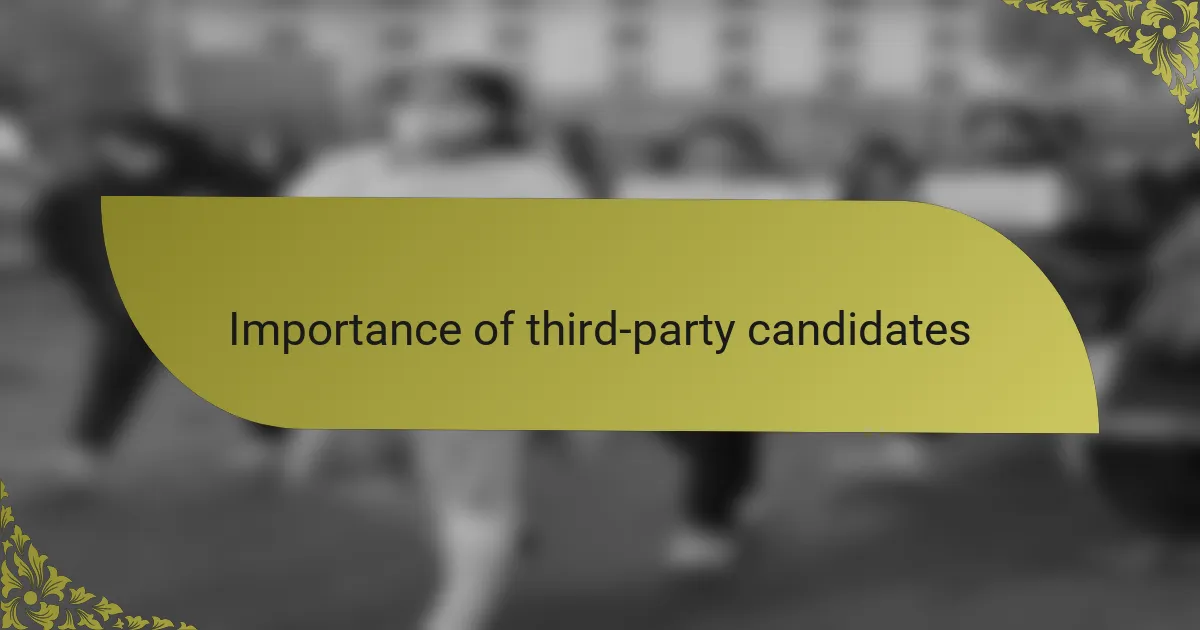
Importance of third-party candidates
Third-party candidates play a crucial role in the political landscape of Louisiana, particularly in a state often dominated by the two major parties. I’ve seen firsthand how these candidates can energize voters who feel disillusioned with the mainstream options. During past elections, I’ve talked to friends who felt their views weren’t represented, and when a third-party candidate appeared on the ballot, it sparked conversations and allowed them to express their beliefs.
Their presence can also encourage dialogue around important issues often overlooked by the major parties. For example, when a candidate focused on environmental concerns in Louisiana’s coastal regions, it resonated with many who live along the coast and face the brunt of climate change.
- Third-party candidates offer alternatives to mainstream political ideologies.
- They can draw attention to specific issues, like environmental or social justice, that might be ignored otherwise.
- They encourage voter turnout by providing options for those feeling disenfranchised.
- Third-party candidates can influence major parties to address their issues during campaigns.
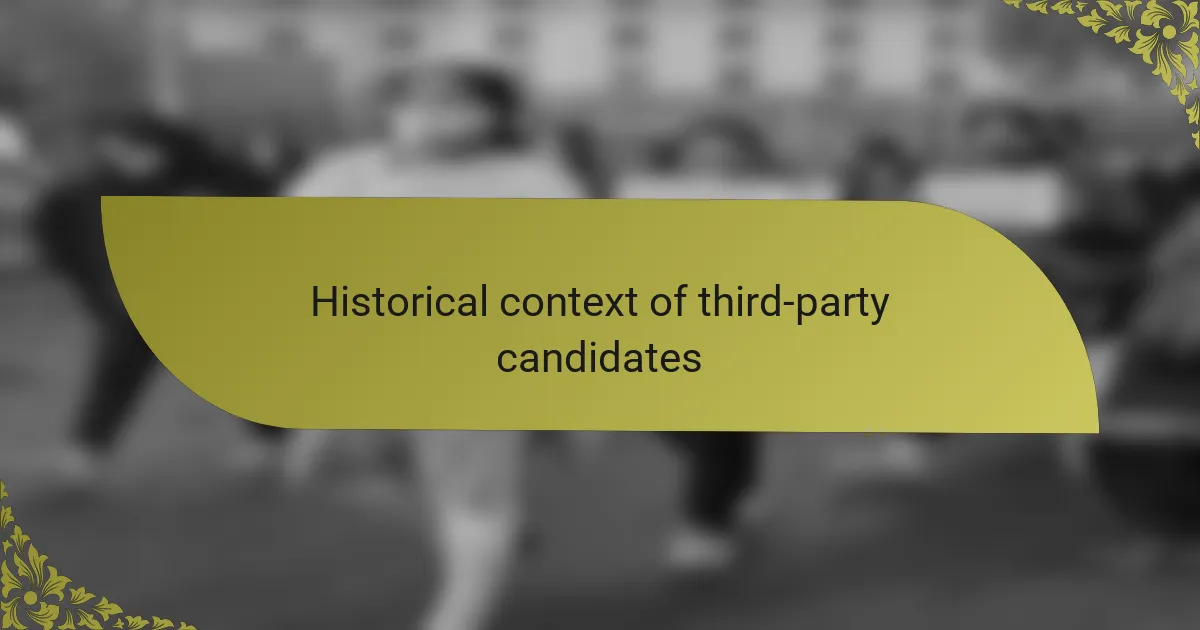
Historical context of third-party candidates
When I think of the historical context of third-party candidates in Louisiana, it takes me back to some pivotal election moments. Louisiana has a rich tapestry of political history, with third parties often emerging in response to the dominant Republican and Democratic parties. For instance, the Reform Party in the late 1990s, founded by Ross Perot, tried to make its mark but struggled with voter recognition and resources, which shows just how challenging it can be for third parties to gain traction in a state with strong partisan loyalties.
Additionally, we can’t overlook the influence of the Populist and Green parties, which, despite facing uphill battles, brought attention to critical issues like agrarian rights and environmental concerns. I’ve seen how candidates from these parties often channel the frustrations of voters who feel unheard by the main parties, igniting hope in a political system that can sometimes feel stagnant.
Here’s a simple comparison of notable third-party candidates in Louisiana’s history:
| Name | Party |
|---|---|
| David Duke | Louisiana Republican Party |
| Jesse Duplantis | Independent |
| Ross Perot | Reform Party |
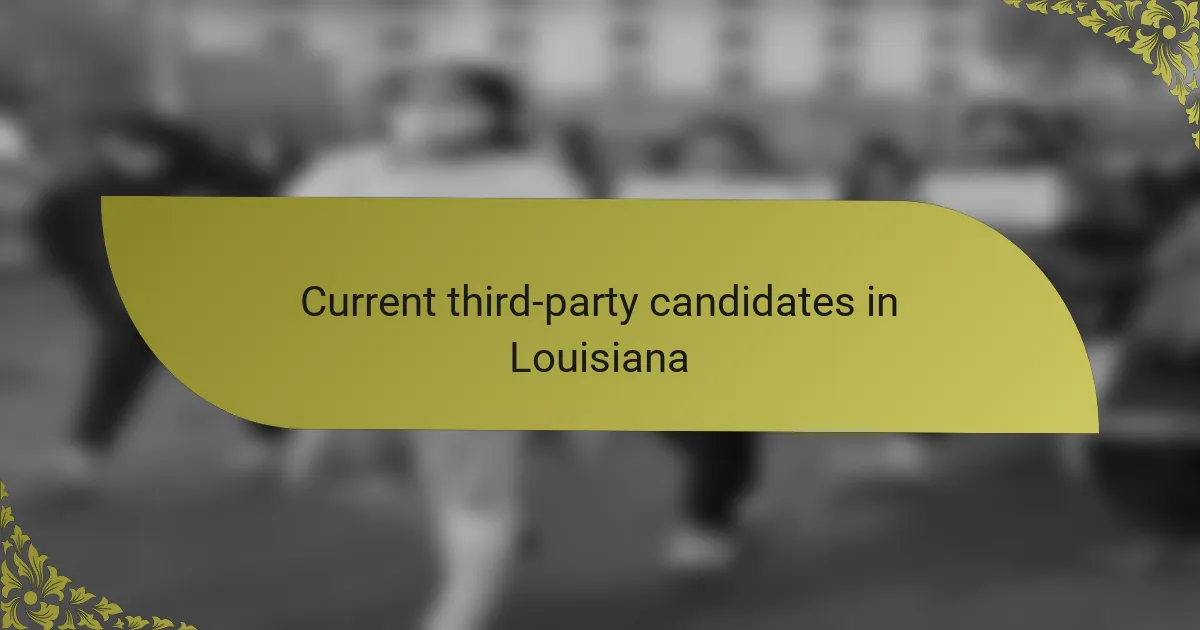
Current third-party candidates in Louisiana
I’ve noticed a few current third-party candidates in Louisiana who are making waves this election cycle. For instance, I recently heard about a candidate from the Libertarian Party who is advocating for significant tax reforms and reduction of government oversight. This candidate is appealing to those who believe in more personal freedoms and less bureaucracy, which I find incredibly relevant in today’s political climate.
Another candidate worth mentioning is from the Green Party, focusing on ecological issues that resonate deeply with residents in hurricane-prone areas. I often share how vital these discussions are, especially when they emphasize sustainability which affects our wetlands and coastal communities. It truly tugs at the heartstrings when I think of the long-term effects climate change could have on our children’s future.
There’s also an Independent candidate running this year who emphasizes transparency and community engagement. I’ve had conversations with voters who are intrigued by this approach, noting how refreshing it is to see someone genuinely interested in local concerns rather than just party politics. It sparks hope in me—can this candidate engage enough to win over the traditional voters? Only time will tell, but their presence certainly adds a new dynamic to the race.
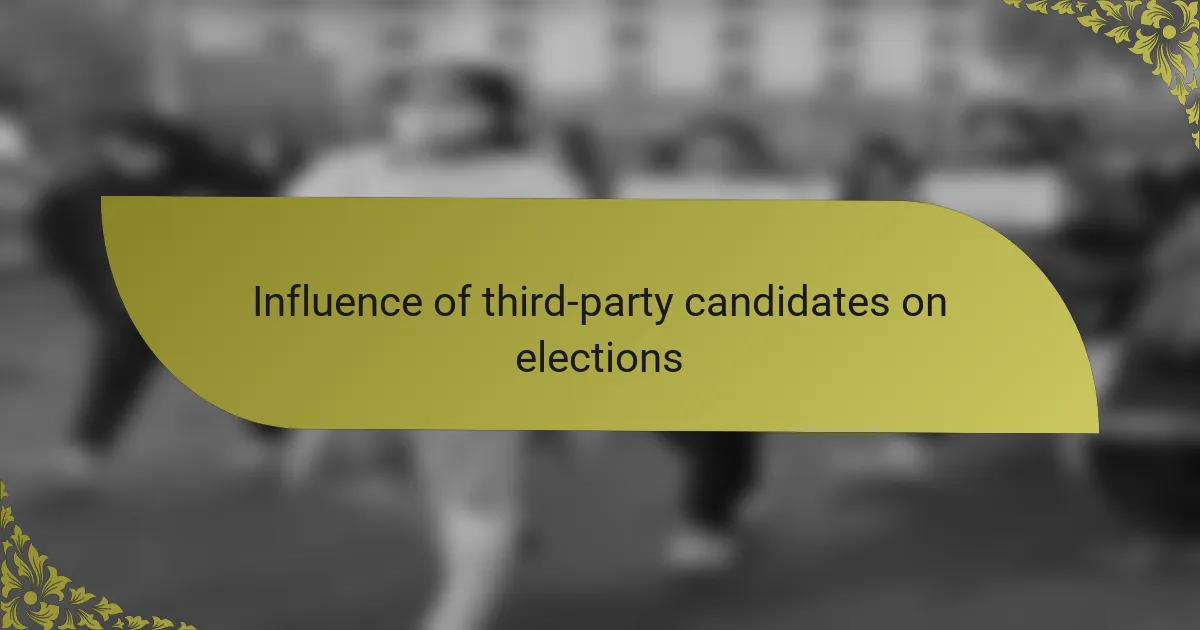
Influence of third-party candidates on elections
Third-party candidates can significantly shape the landscape of elections in Louisiana, often acting as a catalyst for broader discussions on issues that the major parties neglect. I remember during the last gubernatorial election, seeing a candidate from a lesser-known party draw attention to environmental concerns that resonated with many voters, including myself. While they may not win, their presence forces the major candidates to address topics they might otherwise overlook.
Here are some key influences third-party candidates have on elections in Louisiana:
- Impact on major party platforms: Their positions can push mainstream candidates to adopt more progressive or alternative views to attract voters.
- Vote splitting: They can siphon votes away from major party candidates, which sometimes changes the outcome of the election.
- Voter engagement: Often, they encourage disenfranchised voters to participate, creating a more dynamic political discourse.
- Highlighting niche issues: They shine a light on specific community concerns that may be dismissed by larger parties.
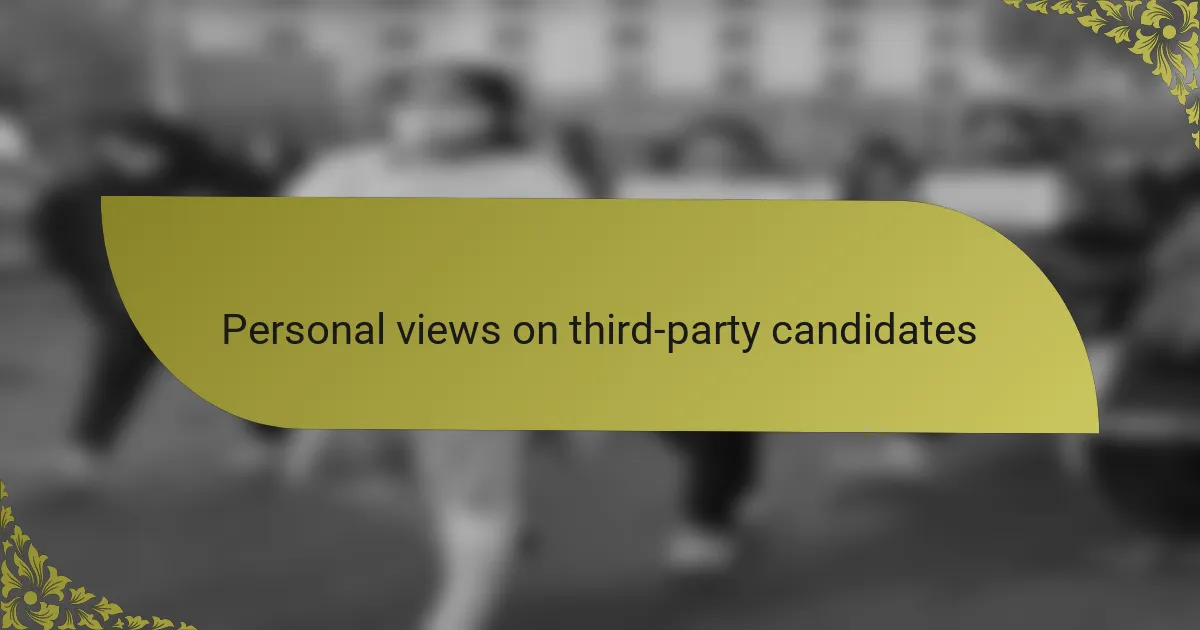
Personal views on third-party candidates
When it comes to third-party candidates in Louisiana, I have mixed feelings. On one hand, they often bring fresh ideas and perspectives that can challenge the status quo of mainstream politics. I remember attending a local forum where a third-party candidate passionately discussed issues that resonated with me, like environmental sustainability in our unique bayou ecosystems. It was refreshing to see someone willing to take risks and address topics often overlooked by major party candidates.
However, the reality is that third-party candidates often struggle to gain traction in a system that heavily favors the two dominant parties. I’ve seen so many hopeful candidates fade into the background after elections, which is disheartening. In my opinion, while they can help diversify the political landscape and give voters more choices, the lack of support and visibility can ultimately dilute their impact.
| Third-Party Advantages | Third-Party Challenges |
|---|---|
| Innovative Ideas | Lack of Funding |
| Diverse Perspectives | Limited Media Coverage |
| Voter Engagement | Difficulty in Ballot Access |